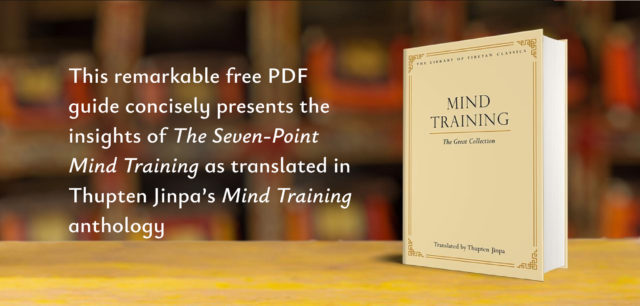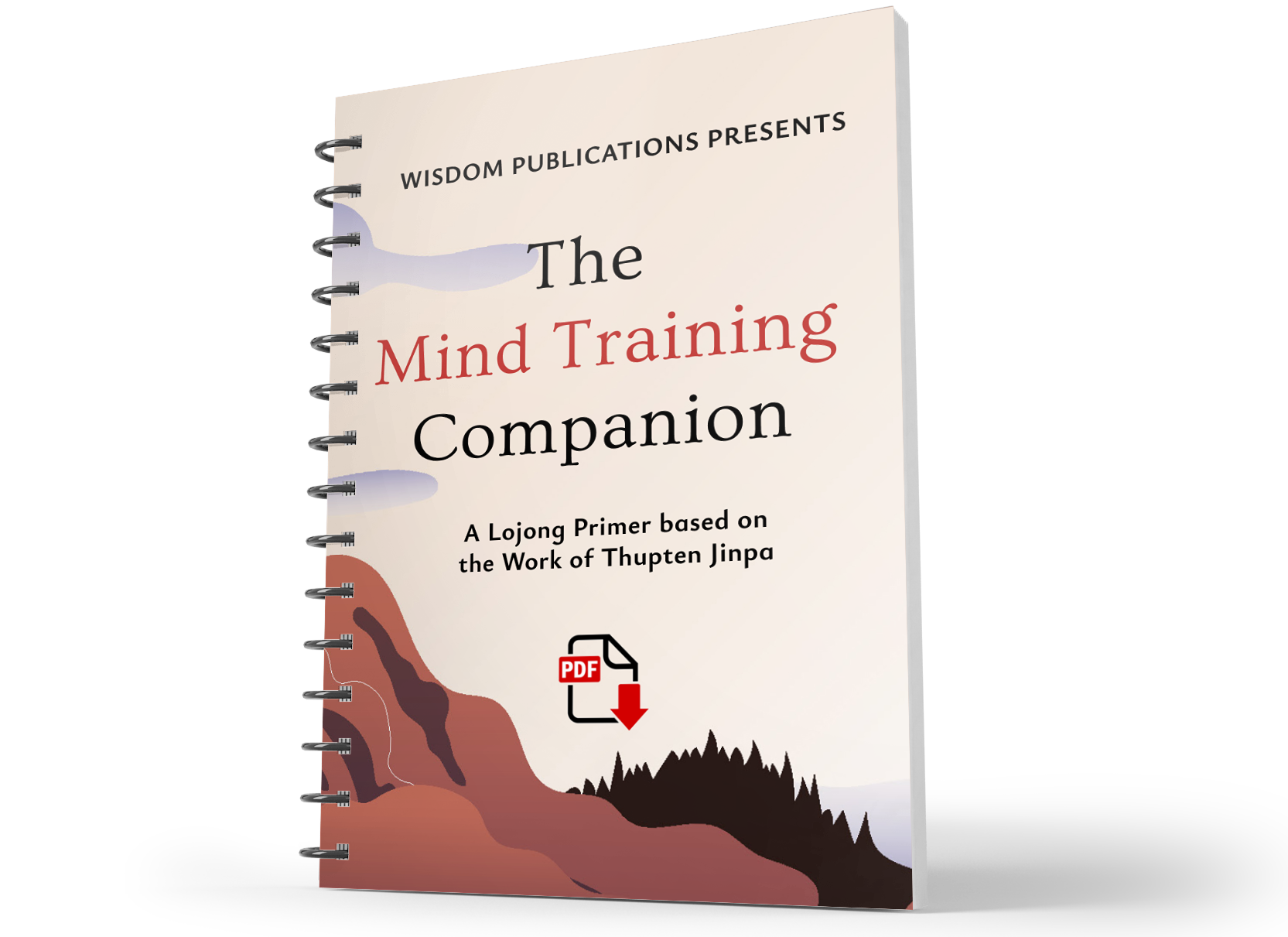
A Free PDF Guide From Wisdom Publications
The Mind Training Companion
A Simple Primer on the Seven Key Points of Lojong
The Mind Training Companion from Wisdom Publications is a rich yet highly concise PDF guide that outlines the seven principal facets of traditional mind training (lojong) practice in highly accessible terms. Access your free download below.
Get Your Free PDF Guide
Read on below to find out more about what you’ll get in your free Mind Training Companion PDF guide. If you want to receive the PDF, simply enter your first name and email address below. You’ll receive the PDF guide within moments and your inbox will not be spammed.
If you don’t see the PDF email in your inbox, kindly check your spam folder.
What’s in the PDF Guide
KEY CONCEPTS EXPLORED

Preparation
This section of the guide deals with essential contemplations and activities to support and generate enthusiasm for the main practice of lojong.
Primary Instruction
This section details how to get at the crux of mind training practice—meditating on the conventional and ultimate awakening minds.
Secondary Instructions
This section covers ancillary aspects of the broader mind training practice, namely transforming adversities in the path of enlightenment, pursuing mind training practice in the gradual process of living and dying, measures of having trained the mind, and the commitments and precepts of lojong.
Sound good? Get the PDF guide now!
Know the Source
Content used in this remarkable PDF guide is drawn exclusively from Thupten Jinpa’s works, notably Mind Training: The Great Collection.
 Thupten Jinpa was educated in the classical Tibetan monastic academia and received the highest academic degree of Geshe Lharam (equivalent to a doctorate in divinity). Jinpa also holds a BA in philosophy and a PhD in religious studies, both from the University of Cambridge, England. Since 1985, he has been the principal translator to the Dalai Lama, accompanying him to the United States, Canada, and Europe. He has translated and edited many books by the Dalai Lama, including The World of Tibetan Buddhism, Essence of the Heart Sutra, and the New York Times bestseller Ethics for the New Millennium. Jinpa has published scholarly articles on various aspects of Tibetan culture, Buddhism, and philosophy, and books such as Songs of Spiritual Experience: Tibetan Poems of Awakening and Insight (co-authored) and Self, Reality and Reason in Tibetan Thought. He serves on the advisory board of numerous educational and cultural organizations in North America, Europe, and India. He is currently the president and the editor-in-chief of the Institute of Tibetan Classics, a nonprofit educational organization dedicated to translating key Tibetan classics into contemporary languages. And he also currently chairs the Mind and Life Institute and the Compassion Institute.
Thupten Jinpa was educated in the classical Tibetan monastic academia and received the highest academic degree of Geshe Lharam (equivalent to a doctorate in divinity). Jinpa also holds a BA in philosophy and a PhD in religious studies, both from the University of Cambridge, England. Since 1985, he has been the principal translator to the Dalai Lama, accompanying him to the United States, Canada, and Europe. He has translated and edited many books by the Dalai Lama, including The World of Tibetan Buddhism, Essence of the Heart Sutra, and the New York Times bestseller Ethics for the New Millennium. Jinpa has published scholarly articles on various aspects of Tibetan culture, Buddhism, and philosophy, and books such as Songs of Spiritual Experience: Tibetan Poems of Awakening and Insight (co-authored) and Self, Reality and Reason in Tibetan Thought. He serves on the advisory board of numerous educational and cultural organizations in North America, Europe, and India. He is currently the president and the editor-in-chief of the Institute of Tibetan Classics, a nonprofit educational organization dedicated to translating key Tibetan classics into contemporary languages. And he also currently chairs the Mind and Life Institute and the Compassion Institute.
About the Lineage
Atiśa Dīpaṃkara (982–1054) was a famed scholar and teacher from the Indian monastic university of Vikramalaśīla and played a key role in the proliferation of the mind training teachings in Tibet.
Serlingpa (circa 10th c.) was a Buddhist scholar of great stature who resided in Sumatra (mordern-day Indonesia). He was an incredibly dear teacher and lojong instructor for Atiśa, who repeatedly proclaimed that whatever degree of good heart he possessed was due entirely to Serlingpa.
Dharmarakṣita (circa 10th c.) was a yogi and prominent lojong teacher of Atiśa. He was said to have upheld Vaibhāṣika tenets and possessed compassion so great that he once cut off a piece of his own flesh and gave it to a sick man as medicine.
Maitrīyogi, or Kusalī Jr. (circa 10th), was a dedicated yogi of Maitreya and important mind training teacher of Atiśa. He was reportedly a proponent of the lineage of first equalizing and then exchanging self and others when meditating on the awakening mind.
Dromtönpa (1005–1064) was Atiśa’s principal disciple, a highly influential lay practitioner and lineage lama, and a notable propagator of the mind training teachings.
Potowa (1027–1105) was one of three important disciples of Dromtönpa, receiving the full written works (tib. gzhung) transmission from his teacher and passing these and other teachings onto his key students Langri Tangpa and Sharawa.
Langri Tangpa (1054–1123) was one of the most influential teachings in the early lojong tradition and is particularly renowned for his highly concise and accessible composition The Eight Verses of Mind Training.
Sharawa (1070–1141) was a disciple of Potowa and a notable holder of the mind training lineage of teachings. He transmitted Atisha’s Root Verses of Mind Training to his student Chekawa.
Chekawa (1102–1176) an important propagator of the mind training teacher and one of the first teachers, if not the first, to present the key elements of Atiśa’s mind training instructions in terms of seven key points.

